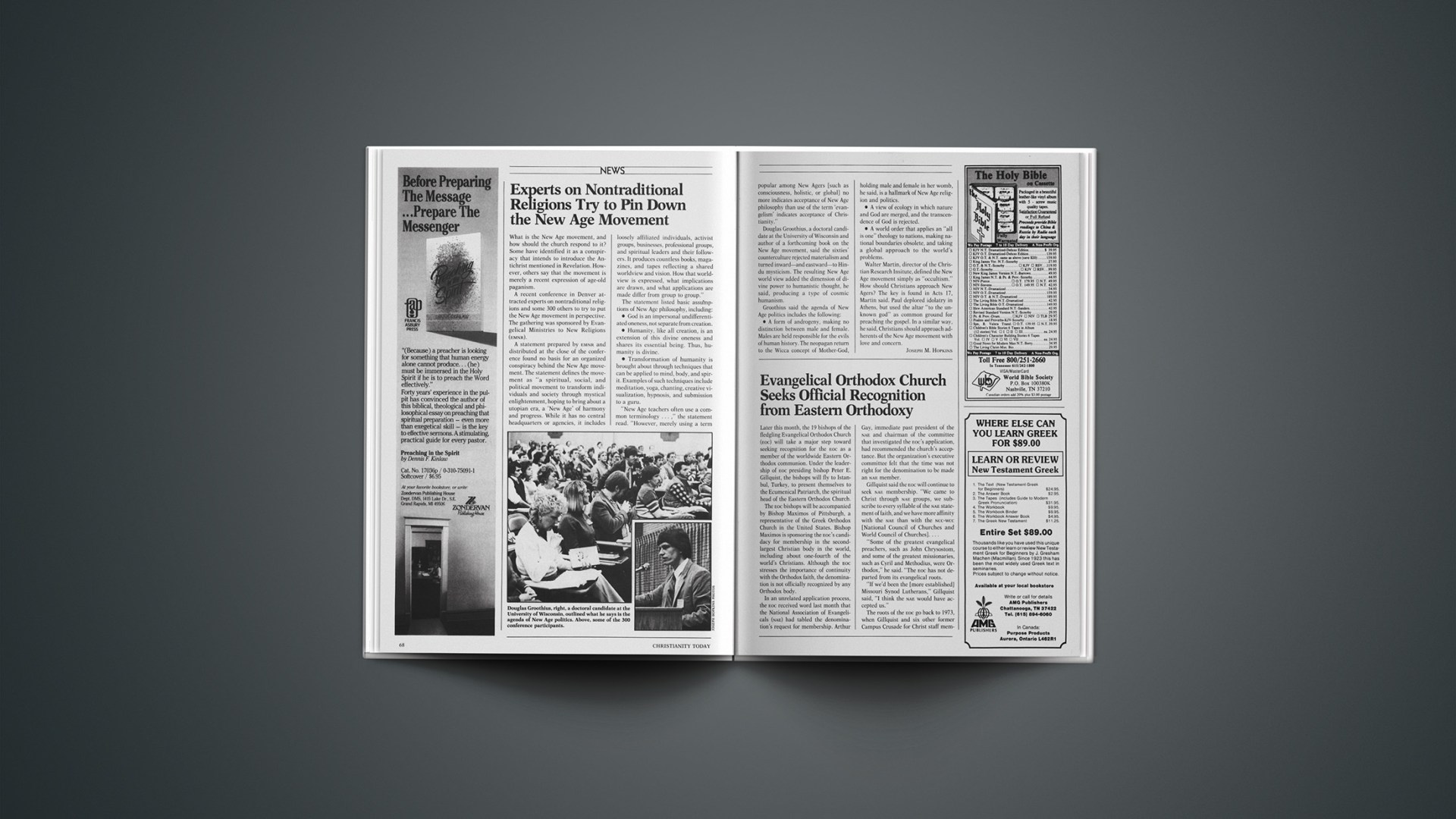Later this month, the 19 bishops of the fledgling Evangelical Orthodox Church (EOC) will take a major step toward seeking recognition for the EOC as a member of the worldwide Eastern Orthodox communion. Under the leadership of EOC presiding bishop Peter E. Gillquist, the bishops will fly to Istanbul, Turkey, to present themselves to the Ecumenical Patriarch, the spiritual head of the Eastern Orthodox Church.
The EOC bishops will be accompanied by Bishop Maximos of Pittsburgh, a representative of the Greek Orthodox Church in the United States. Bishop Maximos is sponsoring the EOC’s candidacy for membership in the second-largest Christian body in the world, including about one-fourth of the world’s Christians. Although the EOC stresses the importance of continuity with the Orthodox faith, the denomination is not officially recognized by any Orthodox body.
In an unrelated application process, the EOC received word last month that the National Association of Evangelicals (NAE) had tabled the denomination’s request for membership. Arthur Gay, immediate past president of the NAE and chairman of the committee that investigated the EOC’s application, had recommended the church’s acceptance. But the organization’s executive committee felt that the time was not right for the denomination to be made an NAE member.
Gillquist said the EOC will continue to seek NAE membership. “We came to Christ through NAE groups, we subscribe to every syllable of the NAE statement of faith, and we have more affinity with the NAE than with the NCC-WCC [National Council of Churches and World Council of Churches].…
“Some of the greatest evangelical preachers, such as John Chrysostom, and some of the greatest missionaries, such as Cyril and Methodius, were Orthodox,” he said. “The EOC has not departed from its evangelical roots.
“If we’d been the [more established] Missouri Synod Lutherans,” Gillquist said, “I think the NAE would have accepted us.”
The roots of the EOC go back to 1973, when Gillquist and six other former Campus Crusade for Christ staff members formed the New Covenant Apostolic Order, a group of house churches scattered across the continent. They had become increasingly interested in the biblical and historical importance of the church and found themselves deeply impressed by the Eastern church fathers and the richness of their ecclesiology. The group was reorganized in 1979 as the EOC. Today the denomination consists of 2,500 members in 27 parishes in 10 states and in Canada.
In Istanbul, the EOC bishops will meet with several standing committees of the Eastern Orthodox Church, and finally with the Ecumenical Patriarch and his staff. The EOC representatives expect to be questioned about their denomination’s theology, ecclesiology, and worship. The denominational leaders say they hope to receive further guidance on how the EOC can be received as a fully recognized member of the Eastern Orthodox communion.
The EOC’s short history has been marked by controversy, especially over its efforts to implement what Gillquist calls biblical teachings regarding church discipline. In 1979, Bill Counts, a former Campus Crusade associate of the EOC’s founding bishops, wrote a paper for the Spiritual Counterfeits Project concerning the extent of authority the EOC bishops exercised over the church’s members.
Ron Zell talked to CHRISTIANITY TODAY as one who had been excommunicated from the EOC. “I feel they hurt people an awful lot by excommunicating a number of people who were struggling to have a relationship with the Lord,” he said. “The leaders set up a very disciplined hierarchical structure, but then they turned authority over to untrained lay ‘priests’ who abused it.”
Zell said he was excommunicated for objecting to the interference of a priest in his marriage. “They said I had made war on them,” he said, “but that was not my intent.” Since then, Gillquist and EOC cofounder Dick Ballew have apologized to Zell.
In a separate incident, former EOC bishop C. Ronald Roberson filed a $10 million lawsuit against the EOC for breach of trust. In the suit, he alleges that after he privately confessed to an adulterous relationship, EOC leaders spread the information to his wife and church before he had a chance to inform them.
David F. Wells, professor of historical and systematic theology at Gordon-Conwell Theological Seminary, said evangelicals who are moving toward Eastern Orthodoxy or Roman Catholicism “are reacting to a historical deficiency in evangelicalism. But I do not feel the solutions they propose are viable.
“Those who move toward Catholicism today are turning to a romantic, nineteenth-century Catholicism that no longer exists. Those who turn to [Eastern] Orthodoxy are retreating from modernity by escaping to another kind of romanticism, the aura, liturgy, and language” of the early church fathers.
DEATHS
Gordon H. Clark, 82, professor of philosophy and chairman of the philosophy department at Covenant College since 1975, taught at the University of Pennsylvania, at Wheaton (Ill.) College, and at Butler University, author of more than 20 books and commentaries; April 9, in Westcliffe, Colorado, of a liver condition.
Baker James Cauthen, 75, executive secretary and later executive director of the Southern Baptist Foreign Mission Board from 1954 to 1979, former missionary to China, professor of missions at two Southern Baptist seminaries; April 15, in Richmond, Virginia, of an apparent stroke.
William Stringfellow, 56, author, lawyer, Episcopalian lay theologian active in the anti-war and civil rights movements, fought for the ordination of women as Episcopal priests; March 2, in Providence, Rhode Island.
Leila Irene Routh McKinney, 95, widow of gospel music composer and Southern Baptist music pioneer B. B. McKinney; March 1, in San Antonio, Texas, of natural causes.
Robert W. M. Cuthbert, 50, president of the Moravian Church in Jamaica, founder of Christian Action for Development in the Caribbean; February 24, in Kingston, Jamaica, after being shot by an unknown assailant.
Michal Stankiewicz, 61, president and former general secretary of the Baptist Union of Poland, editor of books for Polish Baptists; February 21, in Warsaw, Poland, of an apparent stroke.










